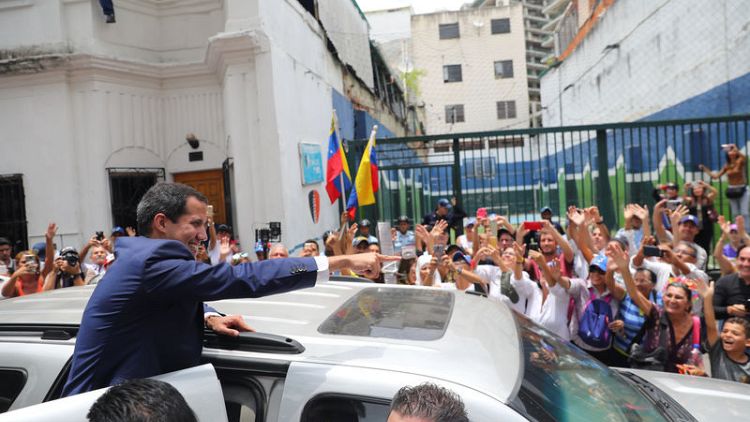CARACAS (Reuters) - Venezuelan opposition leader Juan Guaido on Friday called on supporters to take to the streets on May 1 for what he called "the largest march in the history" of the South American country to keep the pressure on President Nicolas Maduro to leave power.
Guaido, the head of the opposition-controlled National Assembly who in January invoked the constitution to assume an interim presidency on the basis that Maduro's 2018 re-election was illegitimate, reiterated his call for the country's armed forces to take his side in the three-month power struggle.
"They will need to listen to the people saying: enough," Guaido told a crowd gathered at a plaza in eastern Caracas, setting the date for the march for May 1, International Workers' Day.
"We call on all the people to join in the largest march in the history of Venezuela to demand the end to the usurpation so this tragedy can end."
Guaido has been recognised by the United States and most Western nations as the South American country's rightful leader. The oil-rich country is in a sixth year of recession, marked by hyperinflation and shortages of basic goods that have prompted more than three million to emigrate.
Maduro calls Guaido a U.S. puppet seeking to oust him in a coup and blames the country's economic woes on a U.S.-led "economic war." His ruling socialist party has frequently responded to Guaido's calls for protests over the past few months with simultaneous marches of their own.
Guaido did not specify the final destination of the May 1 demonstration. But some in attendance on Friday called out suggestions that they march on the Miraflores presidential palace.
"He is not alone," said Ileidi Vargas, a 58-year-old retired teacher who attended the opposition rally on Friday. "Each day we are moving forward, and there is no turning back. It might not happen tomorrow, but it will be soon."
Despite Guaido's offers of amnesty to members of the military who facilitate a transition, Maduro remains in control of the armed forces and the day-to-day functions of government.
(Reporting by Mayela Armas and Deisy Buitrago; Writing by Luc Cohen; Editing by Marguerita Choy)
